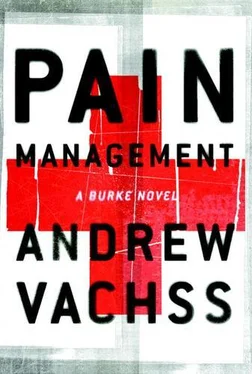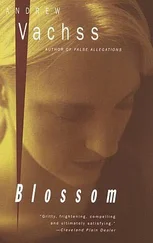You couldn’t even sell your blood so easy, anymore. Ask any derelict. The AIDS scare had dried up the market for untested blood and put the Dracula vans that once roamed every big city’s skid row out of business.
I let the Caddy have its head, my mind busy doing the math. If Rosebud wasn’t on the streets in Portland, she was either someplace else, or nowhere else. I’m a good bloodhound, but I’m no cadaver-dog—that dead drop had me convinced she was alive. And in Portland.
All right. In Portland, then. If she was surviving without working the streets in some way, there were two possibilities. Either she was shacked up—the best way, actually: agoraphobics don’t worry about Wanted posters—or culted up. Cults don’t let the new ones out during indoctrination.
I didn’t like either of those. My best reads on Rosebud came from her little sister, Daisy, and her friend Jenn. But even those who didn’t know her so well agreed that Rosebud was one strong-willed young lady. I couldn’t see her as either needy or dependent enough to go any of the stay-inside routes.
Besides, there’d been little flashes once in a while from my showing the picture around town. Clipper, the pool player’s manager, had the kind of face that didn’t give anything away. But he seemed like a guy who would pay his debts, and that line was still out, baited. Daisy hadn’t admitted getting letters from her sister, but she hadn’t denied it, and that fit for me.
Madison was kind of the same way. Maybe she had gotten a letter from Rosebud. Maybe Rosebud had reached out to Jenn after that first weekend. I thought I’d connected enough with Bobby Ray so he’d at least pass along my message if he saw her. Odom had eyes and ears out there, and he wanted to get paid.
My business card was sitting in after-hours joints, strip clubs, poolrooms . . . stuck to bulletin boards, sides of buildings, plastered on top of posters for musical acts. I even went Nike one better—kids were walking all around the city with rosebud: call b.b.! and my cell phone number stickered onto their backpacks and jackets. I paid five bucks a day for them to be walking billboards.
And then there was Ann.
What there wasn’t was any message from Gem when I returned . . . not home, I guess . . . to her place. I knew where she was. Where she said she was, anyway. I could have called. I guess I said that wrong. When I tried to, I couldn’t do it. Couldn’t punch the damn numbers into the keypad, for some reason. I had every good excuse in the world to call her—Gem’s geek was handling whatever code-breaking was required for me to read what was on Kevin’s laptop. But I knew she would tell me the minute he was done.
I wondered if she’d tell me the minute we were.
I kept thinking about Hong.
And about going back home.
“If you’re looking for Ann, press ‘one,’ “ said the computer-chip voice.
I did that.
“Thank you. Your number is not one recognized by this system. After the tone, please say your name, then press ‘two.’ “
“Hazard. B. B. Hazard,” I told the machinery. And pressed the button.
“Thank you. Please wait while I connect your call.”
The music-on-hold was Tracy Chapman’s “Give Me One Reason.” I flashed on the poster on Rosebud’s wall, waiting.
“Where are you?”
“Ninth and Burnside,” I told her.
“I told you she’s not strolling.”
“You told me a lot of things,” I said.
“Fair enough. You know how to get to the river?”
“It’s a big river.”
“Don’t be cute. It doesn’t go with your looks. You got something to write with?”
“Yeah.”
“Okay, take this down.” She gave me directions to a spot on the other side of the Fremont Bridge, in North Portland, between the river and the Albina Yard of the Union Pacific tracks. I didn’t know there was anything there other than empty space, but she said I’d find it easy enough.
Turned out to be a warehouse district, with an upscale bar positioned like a sentinel right where I turned off Interstate Avenue. There was no activity at the warehouses—I guessed they stopped running the trains after a certain time at night.
About five cross-streets down, I spotted one of those old silver Airstream trailers. It had one whole side open under a bright-yellow awning—looked like a food-concession booth at a carnival, only much longer. Over to one side, a bunch of cut-down fifty-five-gallon oil drums with the unmistakable rich smell of barbecue wafting off in all directions. Magic Sam’s “What Have I Done Wrong?” poured out of invisible speakers, like they were playing my walk-out music for a fight.
It looked like someone had raided the table-and-chairs section of a Goodwill warehouse and scattered the pickings all around the trailer at random: wood, plastic, and everything in between, all sizes and shapes. All they had in common was that nothing matched. Christmas lights were strung above, interspersed with blue bug-zappers. The whole scene looked like something you’d find any summer night on captured-for-the-moment vacant lots in cities from Detroit to Dallas. When a cook’s got a rep for real barbecue, there’s no need for a permanent location. That’s what they mean by a “following.”
The only discordant note was the cars. Instead of a bunch of bondo’ed American iron, they were all seriously high-end. I spotted at least three Rollers, a Ferrari F50, a half-dozen miscellaneous Porsches, a few limos, and a pimped-out gold Hummer—all as neatly parked as if a valet had handled the chore. There was even a huge black custom Featherlite motorcoach, slide-outs fully extended.
Ann’s Subaru looked like a poor relation . . . but not one you wanted to fuck with.
I stopped a couple of blocks away from the trailer, killed the engine. A Filipino with a high pompadour and a glistening white jacket materialized out of the dark. He didn’t look like anybody’s houseboy.
“Twenty to park here,” he said.
I handed him a bill.
“ We park the cars,” he said.
“How do I find you when I want to leave?” I asked him.
“Just go anywhere near the cars, mister. One of us’ll find you in ten seconds.”
Meaning the twenty bucks wasn’t for parking, it was for protection. Fair enough. I climbed out of the Caddy. If the Filipino was sneering at my low-class ride, it didn’t reach his face. I didn’t see a bulge anywhere on his starched white jacket, but a knife doesn’t usually make one.
I walked over to the Airstream, waited my turn on line, ordered a pulled-pork sandwich with a side of coleslaw and the biggest lemonade they had. That swallowed the best part of another twenty.
I took my food and headed over to the sitting area. Spotted what looked like a discarded canasta table with folding legs surrounded by three ripped-cushion chrome-and-vinyl kitchen chairs. Took me only a second to realize that there was no wall to keep my back to, so I sat down and started to work on the sandwich. Didn’t surprise me at all when it turned out to be delicious.
Chicago kept coming to Portland through the speakers. Luther Allison’s “The Skies Are Crying.” Eddie Boyd’s “3rd Degree.” Susan Tedeschi’s “It Hurt So Bad.”
Just as I was beginning to regret I hadn’t ordered two sandwiches when I’d had the chance, she dropped into the chair right across from me. This time, she was a brunette, long hair piled on top of her head, held together by a purple scrunchie the same shade as her cotton pullover. The scrunchie was a nice touch, drawing the eye away from the wig.
“Israel makes the best barbecue in the world,” she said.
It was too dark to see her eyes, so I focused hard on the pale oval of her face, expecting some lame joke about Jews and pork . . . at best.
Читать дальше











